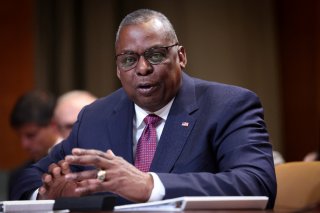U.S. Defense Secretary Heads to Thailand to Bolster Asian Alliances
Successive U.S. administrations have sought closer ties with Thailand and other Asian nations as counterweights to rising Chinese ambitions in the Indo-Pacific.
U.S. secretary of defense Lloyd Austin met with Prime Minister Prayuth Chan-ocha of Thailand on Monday to strengthen what Austin previously characterized as the United States’ “unparalleled network of alliances and partnerships” in Southeast Asia. During their meeting, Austin and Prayuth “shared perspectives on regional security issues and discussed opportunities to strengthen the U.S.-Thai alliance,” according to a readout published by the Defense Department. The two leaders also discussed Thai military modernization and cooperation between Bangkok and Washington in crucial areas, including cyber warfare and space technology.
One notable omission from the Defense Department’s report was any discussion of the F-35 Lightning II fighter, which the Thai government has indicated an interest in purchasing on previous occasions. Austin had previously met Prayuth, who has served concurrently as Thailand’s defense minister since 2019, in Washington during the Thai leader’s visit to the United States in May.
Relations between Thailand and the United States have been close since Thailand’s prominent role on the side of the United States during the Vietnam War. In 2003, President George W. Bush designated Thailand a “major non-NATO ally,” a distinction that confers many benefits on designees, such as eligibility for weapons transfers and greater access to American training.
Although relations between Washington and Bangkok soured in 2014 following a coup d’etat by a junta of Thai Army officers led by Prayuth, they have steadily improved as America’s relationship with China has deteriorated. Successive U.S. administrations have sought closer ties with Thailand and other Asian nations as counterweights to rising Chinese ambitions in the Indo-Pacific. However, Beijing has attempted to do the same through various political and economic initiatives over the past decade.
Austin’s trip to Thailand took place after his attendance at the Shangri-La Dialogue security summit in Singapore over the weekend. During the summit, Austin and Chinese defense minister Wei Fenghe directed harsh words at the opposing nation’s foreign policy. Austin accused Beijing of engaging in “provocative and destabilizing military activity near Taiwan,” while Wei claimed that the United States had attempted to deceptively advance its interests in Asia “under the guise of multilateralism.”
Austin later maintained that the two officials’ discussions had been “an important step in our efforts to develop open lines of communication” with Beijing.
“America never … shies away from honest competition, but we don’t seek conflict [or] a region that’s split into hostile blocs,” he added.
Trevor Filseth is a current and foreign affairs writer for the National Interest.
Image: DVIDS.

